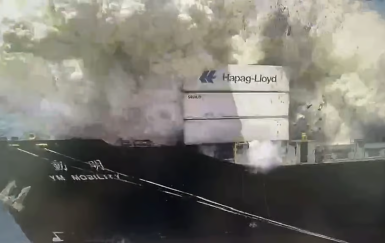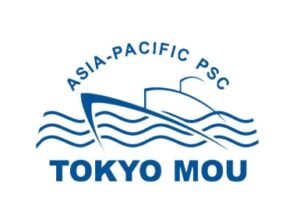 The China Maritime Safety Administration (CMSA) has published a report on its investigation into the explosion and subsequent fire on the Taiwanese-owned container vessel YM Mobility at China’s Ningbo Port on 9 August 2024. An explosion occurred in a container loaded with dangerous goods on board near the ship’s bow. According to the shipper’s declaration, the container was a reefer used as a substitute for a dry container, without requiring power connection. The estimated economic loss resulting from in the incident was about CNY90 million (US$13 million).
The China Maritime Safety Administration (CMSA) has published a report on its investigation into the explosion and subsequent fire on the Taiwanese-owned container vessel YM Mobility at China’s Ningbo Port on 9 August 2024. An explosion occurred in a container loaded with dangerous goods on board near the ship’s bow. According to the shipper’s declaration, the container was a reefer used as a substitute for a dry container, without requiring power connection. The estimated economic loss resulting from in the incident was about CNY90 million (US$13 million).
The CMSA determined that the cargo in the affected reefer container included tert-Butyl peroxybenzoate (TBPB), a compound that has thermal instability and can self-decompose at room temperature, thus releasing a large amount of heat and producing gas or vapour. The unplugged reefer has been used to store TBPB despite having poor heat dissipation properties. The heat generated by the TBPB self-decomposition reaction therefore accumulated in the reefer. The continuous increase in temperature accelerated the self-decomposition reaction, which then resulted in thermal runaway and the subsequent explosion and fire.
The CMSA also determined that the incident occurred during a period when summer temperatures in Shanghai, where the TBPB was packed, were higher than usual. On July 25, during the packing of the TBPB cargo, the packing temperature was consistent with the ambient temperature (about 35°C). From July 25 to August 9, Shanghai and Ningbo port continued to have experience high temperatures, with the highest daytime temperature reaching about 40° Celsius, and the outside temperature of containers stacked in the open air was even higher. The high outside temperature then caused the temperature in the reefer to also be high when the TBPB was packed, thus increasing the transportation risk.
The investigation showed that the operator failed to exercise sufficient care when reviewing the cargo transportation plan. In particular, the operator failed to conduct a full safety assessment of the stability of the cargo and the risk of thermal runaway in view of the actual conditions such as high summer temperatures, self-separation of the cargo, and thermal insulation of the unplugged reefer. The operator had agreed to use the unplugged reefer to transport the dangerous goods and so did not consider the temperature changes in the container during transportation.
The investigation team determined that the shipper and the operator had chosen to use an unplugged reefer to transport TBPB. When the two parties agreed, selected and reviewed the TBPB transportation plan, they failed to take sufficient caution to combine the risk factors such as the high temperature weather at that time, the heat release characteristics of the self-decomposition reaction of the cargo, and the thermal insulation and airtightness of the unplugged reefer. They also did not fully study and judge the possible safety risks in the process of packing and transportation. The investigation team found that both the operator and the shipper were responsible for the incident.

